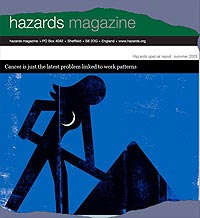Shiftworkers Receive Second Class Treatment From HSE
Concersn over shift workers and the risks to their health are increasing as further research highlights a greater risk of heart disease and cancers amongst those who work nights.
Not only that, but a new Hazard report, While You Were Sleeping claims that shiftworkers in the UK are facing serious health risks but are getting second class safety because the HSE clocks off outside normal office hours.
 University of Stirling Professor, Andrew Watterson, in his report 'While you were sleeping,' says the estimated 3.5 million shiftworkers in the UK are getting second class treatment because no staff in the HSE are rostered to work outside of normal hours. This means after dark there is no preventive health promotion work and there are no routine graveyard shift health and safety inspections by its 1,300-strong contingent of workplace inspectors.
University of Stirling Professor, Andrew Watterson, in his report 'While you were sleeping,' says the estimated 3.5 million shiftworkers in the UK are getting second class treatment because no staff in the HSE are rostered to work outside of normal hours. This means after dark there is no preventive health promotion work and there are no routine graveyard shift health and safety inspections by its 1,300-strong contingent of workplace inspectors.
According to Professor Watterson, who heads up the University’s Occupational and Environmental Health Research Group:
“Shiftworkers face all the same risks as workers on normal hours, plus a slew of risks all of their own. Atypical working hours have been linked to conditions including breast cancer, prostate cancer, non-Hodgkin’s lymphoma, heightened injury and disaster risk, fatigue, heart disease risk factors and pregnancy problems. Evidence is emerging that these health effects combined make shiftworkers, particularly women shiftworkers, far more likely to take early ill health retirement.”
He says that while some workers will always have to work anti-social hours, “that doesn’t mean they should be an after-hours army of zombies overlooked by the official safety watchdog. It certainly doesn’t mean employers should get away with the more onerous work patterns – longer hours, inadequate breaks between shifts, unpredictable shift patterns – that can lead to serious health problems longer-term.”
He is concerned that official guidance from HSE plays down many of the chronic health risks and ignores others, like cancer and heart disease, entirely, so that neither workers nor their doctors are likely to make the link between working hours and patterns of poor health.
“We live in a 24-7-365 working world, but HSE is near dormant on the working hours issue,” warns Professor Watterson. “It undertakes no routine inspections and has taken no prosecutions in the last five years related to health risks arising from gruelling and body wrecking work patterns – in fact it barely takes any action on work-related ill health at all. While the HSE remains unmoved, there is evidence the health effects of shiftworking are an increasing concern for the workforce.”
‘While you were sleeping,’ published online in the health and safety journal Hazards, calls for more HSE resources to be targeted at workers on atypical hours, rigorous enforcement of working time law, an end to the UK opt-out from the working time directive’s 48-hour working week ceiling, and for the UK Government to follow the Danish Government’s lead and compensate workers with breast cancer related to long-term night work.
In response to the report, HSE's Chief Medical Advisor, John Osman, commented:
“HSE does carry out preventative inspections out-of-hours where appropriate and necessary; however, inspections are just one in a range of tools we use to regulate and influence employers. An important element of HSE's normal inspections is an examination of provision for ensuring the health and safety of those working outside 'office' hours. This examination includes a physical inspection of the control measures and consultation with employees and trade unions or safety representatives.
"Any concerns raised with HSE about shift or out-of-hours working are treated seriously and investigated – this may include an out-of-hours inspection. If HSE took any enforcement action it would not necessarily show as a Working Time Regulation matter and could fall under the Health and Safety at Work etc. Act.”
The HSE has recently commissioned a major research study (with the University of Oxford) that aims to add further to its understanding of the reported association of shift work with breast cancer, other cancers and other major diseases. A further aim of the research is to see if any particular aspects of shift work give rise to any risk that might exist. The study, commissioned in 2007, runs from December 2008 to December 2011.
You can read the report by clicking the pic above.
Source: Workplace Law Network / Hazards